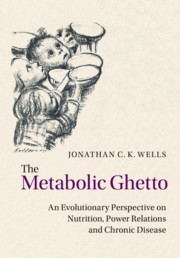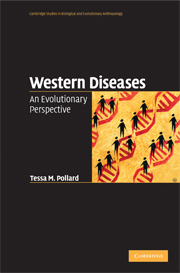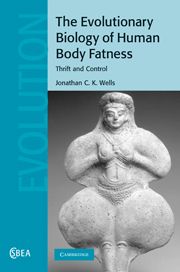The Metabolic Ghetto
An Evolutionary Perspective on Nutrition, Power Relations and Chronic Disease
£28.99
- Author: Jonathan C. K. Wells, Institute of Child Health, University College London
- Date Published: March 2019
- availability: Available
- format: Paperback
- isbn: 9781108737579
£
28.99
Paperback
Other available formats:
Hardback, eBook
Looking for an inspection copy?
This title is not currently available on inspection
-
Chronic diseases have rapidly become the leading global cause of morbidity and mortality, yet there is poor understanding of this transition, or why particular social and ethnic groups are especially susceptible. In this book, Wells adopts a multidisciplinary approach to human nutrition, emphasising how power relations shape the physiological pathways to obesity, diabetes, hypertension and cardiovascular disease. Part I reviews the physiological basis of chronic diseases, presenting a 'capacity-load' model that integrates the nutritional contributions of developmental experience and adult lifestyle. Part II presents an evolutionary perspective on the sensitivity of human metabolism to ecological stresses, highlighting how social hierarchy impacts metabolism on an intergenerational timescale. Part III reviews how nutrition has changed over time, as societies evolved and coalesced towards a single global economic system. Part IV integrates these physiological, evolutionary and politico-economic perspectives in a unifying framework, to deepen our understanding of the societal basis of metabolic ill-health.
Read more- Proposes a novel broad synthesis of human nutrition and chronic diseases that will appeal to those looking for societal rather than technical solutions to the leading cause of human mortality in the modern world
- Integrates perspectives on physiology, evolutionary biology and societal causes of inequality, and provides a unifying framework to draw together these disparate areas of research
- Avoids mathematical treatment and scientific jargon to ensure the content is accessible to both biomedical and social scientists
Reviews & endorsements
'Is it really possible to bring together philosophy, economics, history, evolutionary biology, epidemiology, nutrition and metabolism to understand obesity and chronic disease? Jonathan C. K. Wells has done it in an immensely readable and insightful way. A wonderful book.' Michael Marmot, University College London
See more reviews'No other book before has provided such a sophisticated and eloquent argument integrating knowledge about foetal and childhood environment and nutrition, with impacts of social, economic and historical factors. Jonathan C. K. Wells persuasively argues that a broad scope and an evolutionary framework are necessary to build our understanding of chronic and globally important diseases. Consequently, [he] succeeds in achieving a true consilience of very disparate perspectives on our health.' Grazyna Jasienska, Jagiellonian University, Poland
' [T]his book is a sobering look at how social hierarchy can undermine the health of the lower-ranked within a society and within the global economic order. A significant strength of the book lies in the variety of perspective and conceptual models evaluated. … It is an ambitious book that tackles big questions …' Darna L. Dufour, American Journal of Human Biology
'The Metabolic Ghetto is both a scholarly book and a call to action. Wells's arguments are carefully presented and well documented … Readers who are interested in the ways in which social structures affect health and who would like to understand the central role of nutrition in mediating the effects of socioeconomic inequalities on health will learn much from this book. Readers who are interested in global health will especially welcome Wells's international perspective and his concern for the health of people in low- and middle-income countries as well as for those in economically advantaged societies. … the readers who will be most attracted to the book are those who, in Marx's words, believe that the task of natural philosophers is not only to interpret the world but to change it.' Robert L. Perlman, American Journal of Physical Anthropology
Customer reviews
Not yet reviewed
Be the first to review
Review was not posted due to profanity
×Product details
- Date Published: March 2019
- format: Paperback
- isbn: 9781108737579
- length: 623 pages
- dimensions: 245 x 171 x 30 mm
- weight: 1.04kg
- contains: 187 b/w illus. 27 tables
- availability: Available
Table of Contents
Preface
1. Introduction
Part I. The Physiology of Chronic Disease:
2. Models of chronic disease
3. Links between nutrition and health
4. The developmental origins of disease
5. Life-course models of chronic disease aetiology
6. Applying the capacity-load model
Part II. An Evolutionary Perspective on Human Metabolism:
7. Life history strategy
8. Ancestral environments
9. The evolution of human adaptability
10. Sensitivity in early life
11. The evolutionary biology of inequality
12. The metabolic ghetto
Part III. A Historical Perspective on Human Nutrition:
13. The emergence of agriculture
14. Trade, capitalism and imperialism
15. Hierarchy and metabolic capacity
16. The emergence of consumerism
17. Enforcing obedience
18. The dual burden of malnutrition
Part IV. Power, Nutrition and Society:
19. A series of games
20. A question of agency
Epilogue
Index.
Sorry, this resource is locked
Please register or sign in to request access. If you are having problems accessing these resources please email [email protected]
Register Sign in» Proceed
You are now leaving the Cambridge University Press website. Your eBook purchase and download will be completed by our partner www.ebooks.com. Please see the permission section of the www.ebooks.com catalogue page for details of the print & copy limits on our eBooks.
Continue ×Are you sure you want to delete your account?
This cannot be undone.
Thank you for your feedback which will help us improve our service.
If you requested a response, we will make sure to get back to you shortly.
×







